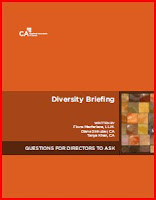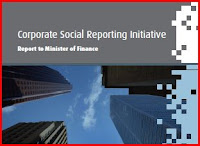Friday, July 30, 2010
Integrated reporting – Closing the loop of strategy
A 2010 publication by KPMG notes that it is time for a transformation in corporate reporting: from a focus on financial information to a concept where all types of relevant information for assessing and evaluating a company’s quality, performance, value and impact are reported in a comprehensive way. There is a clear need for this transformation. However, integrating reporting ‘for the sake of integrating’ is set to fail and disappoint stakeholders. Only companies with a profound connection of their sustainability efforts with their strategy and the management cycle should start taking steps towards integrated reporting. Companies should also ensure that the needs of all relevant stakeholder groups who use the information are satisfied. In this publication, Integrated reporting – Closing the loop of strategy, these are called the management perspective and the communication perspective, which should fuse together in order to create successful integrated reporting.
Monday, July 26, 2010
CSA - Continuous Disclosure Review Program for March 31, 2010
Canadian Securities Administrators (CSA) have issued Staff Notice 51-332 Continuous Disclosure Review Program Activities for the fiscal year ended March 31, 2010, which summarizes the results of the CSA’s continuous disclosure (CD) review program. The number of reviews (1,351) represents a 23% increase from fiscal 2009 when the CSA conducted 1,094 reviews. The main reason for this increase was the completion of International Financial Reporting Standards (IFRS) transition disclosure reviews. To assist reporting issuers, Staff Notice 51-332 includes detailed examples of the common deficiencies found during the reviews in financial statements, Management’s Discussion and Analysis (MD&A) and oil and gas disclosure.
Friday, July 23, 2010
The IFRS Changeover — A Guide for Users of Financial Reports
The Canadian Institute of Chartered Accountants has published The IFRS Changeover — A Guide for Users of Financial Reports. The purpose of this guide is to provide a perspective for users of external financial reports on matters arising from Canada’s imminent change to International Financial Reporting Standards (IFRS) for public companies. Members of audit committees and financial statement preparers may also find the guidance useful.
Monday, July 19, 2010
Diversity Briefing: Questions for Directors to Ask
The Canadian Institute of Chartered Accountants (CICA) recently issued Diversity Briefing: Questions for Directors to Ask. The guidance focuses on diversity within companies and the ways in which it comes to the attention of the board of directors through the oversight of strategy, risk and executive succession. It also addresses the importance of diversity on the board itself and offers questions that are intended to be a catalyst for useful dialogue among directors, for directors with management, or with outside advisors.
Monday, July 12, 2010
IT Strategic Planning for SMEs - CICA White Paper
In today’s interconnected world, most organizations rely on information technology (IT). Their dependence ranges from simple accounting and office systems to advertising on the Web, ordering supplies and services online, managing schedules, payrolls and inventories, monitoring automated processes, communicating with peers, customers and stakeholders, delivering online services, and conducting virtual Internet-based operations. Whatever their needs, business owners and managers must invest considerable time and money to maintain the IT environment required to support their businesses. Given the strategic importance of IT, the Canadian Institute of Chartered Accountants (CICA) has issued a White Paper on IT Strategic Planning for SMEs. The Paper aims to raise awareness of the need for an IT strategic plan for small and medium-sized business owners and management. It may also be of interest to business management in larger organizations.
Friday, July 9, 2010
Transparency and Reporting
According to Wikipedia, the three most important facets of transparency are openness, communication and accountability. Can transparency, therefore, necessarily be implied where all positive and negative customer sentiments are reported in the public domain, for all to see? One can determine a logical framework for transparency by simply reversing the order of the elements. Accountability should form the basis for transparency, on which communication and openness should be founded (see Figure 1). Read the article "Transparency and Reporting" in Accountancy SA Magazine online.
Monday, July 5, 2010
Data Level Assurance - a new research study
In recent years, corporate reporting has evolved towards the reporting of data elements such as performance metrics, statistics and a variety of ad hoc measurements of business activities. There are indications that many users are replacing increasingly complex and cumbersome financial statements with the easier-to-understand data elements often reported on corporate websites or in news releases. Since users are relying on this information, some have questioned whether there is a need for assurance on the data being reported. In response, the Canadian Institute of Chartered Accountants (CICA) has published a research study, Data Level Assurance, to recommend solutions to data level assurance issues and to suggest a future course of action for the profession in this area.
Friday, July 2, 2010
Recommendations to enhance corporate social reporting in Canada
York University’s Hennick Centre for Business and Law, together with Jantzi-Sustainalytics have issued a report on their Corporate Social Reporting Initiative. The report makes recommendations on how the Ontario Securities Commission (OSC) can begin to improve corporate disclosure of social practices. It addresses the reasons and scope for, and the regulation of, corporate social reporting which applies to areas such as human and labour rights, employee health and safety, local community development and product safety. It recommends that the OSC clarify existing disclosure obligations on the materiality of social issues to investors’ decisions and long-term corporate performance. It also recommends that the OSC facilitate continued dialogue among relevant stakeholders in order to support a shift toward more standardized metrics and reporting.
Subscribe to:
Comments (Atom)







